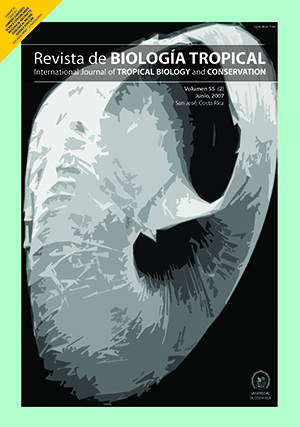Abstract
A reliable bioassay procedure was developed to test ingested Bacillus thuringiensis (Bt) toxins on the rice delphacid Tagosodes orizicolus. Initially, several colonies were established under greenhouse conditions, using rice plants to nurture the insect. For the bioassay, an in vitro feeding system was developed for third to fourth instar nymphs. Insects were fed through Parafilm membranes on sugar (10 % sucrose) and honey bee (1:48 vol/vol) solutions, observing a natural mortality of 10-15 % and 0-5 %, respectively. Results were reproducible under controlled conditions during the assay (18±0.1 °C at night and 28±0.1 °C during the day, 80 % RH and a 12:12 day:light photoperiod). In addition, natural mortality was quantified on insect colonies, collected from three different geographic areas of Costa Rica, with no significant differences between colonies under controlled conditions. Finally, bioassays were performed to evaluate the toxicity of a Bt collection on T. orizicolus. A preliminary sample of twenty-seven Bt strains was evaluated on coarse bioassays using three loops of sporulated colonies in 9 ml of liquid diet, the strains that exhibited higher percentages of T. orizicolus mortality were further analyzed in bioassays using lyophilized spores and crystals (1 mg/ml). As a result, strains 26-O-to, 40-X-m, 43- S-d and 23-O-to isolated from homopteran insects showed mortalities of 74, 96, 44 and 82 % respectively while HD-137, HD-1 and Bti showed 19, 83 and 95 % mortalities. Controls showed mortalities between 0 and 10 % in all bioassays. This is the first report of a reliable bioassay procedure to evaluate per os toxicity for a homopteran species using Bacillus thuringiensis strains.Comments

This work is licensed under a Creative Commons Attribution 4.0 International License.
Copyright (c) 2007 Revista de Biología Tropical
Downloads
Download data is not yet available.






